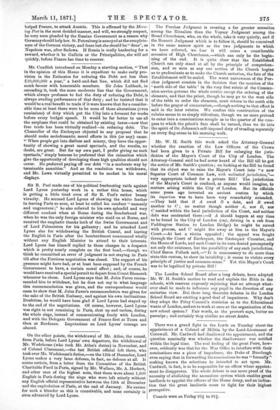On the other points, the withdrawal of Mr. Atlee, the
consul, from Paris, before Lord Lyons' own departure, the withdrawal of Mr. Wodehouse (who took Mr. Atlee's duties) in November, and of Colonel Claremont,—the last British official left there, who took over Mr. Wodehouse's duties,—on the 12th of December, Lord Lyons makes a very lame defence, in fact, no defence at all. It seems certain, from a letter from the Committee of the British Charitable Fund in Paris, signed by Mr. Wallace, Mr. A. Herbert, and other men of the highest note, that there were about 1,600 English in Paris during the siege who were left utterly without any English official representative between the 12th of December and the capitulation of Paris, at the end of January. No excuse for such a blunder as this is conceivable, and none certainly is even advanced by Lord Lyons.
The Purchas Judgment is creating a far greater sensation among the Ritualists than the Voysey Judgment among the Broad Churchmen, who, on the whole, take it very quietly, and if the Bennett Judgment which is to follow it, should be conceived in the same narrow spirit as the two judgments to which we have referred, we fear it will cause a considerable secession of High Churchmen,—which can only be the begin- ning of the end. It is quite clear that the Established Church can only stand at all by the principle of comprehen- sion, and so soon as any one section of the Church begins so to predominate as to make the Church sectarian, the fate of the Establishment will be sealed. The worst narrowness of the Par- chas judgment consists in the decision that the mention of the north side of the table' in the very first rubric of the Commu- nion service governs the whole service except the ordering of the elements, and that the priest, though he may go to the wed aids of the table to order the elements, must return to the north aide before the prayer of consecration,—though nothing to that effect is said in the later rubrics. We confess this construction of the rubrics seems to us simply ridiculous, though we no more pretend to enter into a conscientious scruple as to the quarter of the com- pass to which the priest's face shall be turned, than we do into the spirit of Dr. Johnson's self-imposed duty of treading separately on every flag-stone in his morning walk.


































 Previous page
Previous page